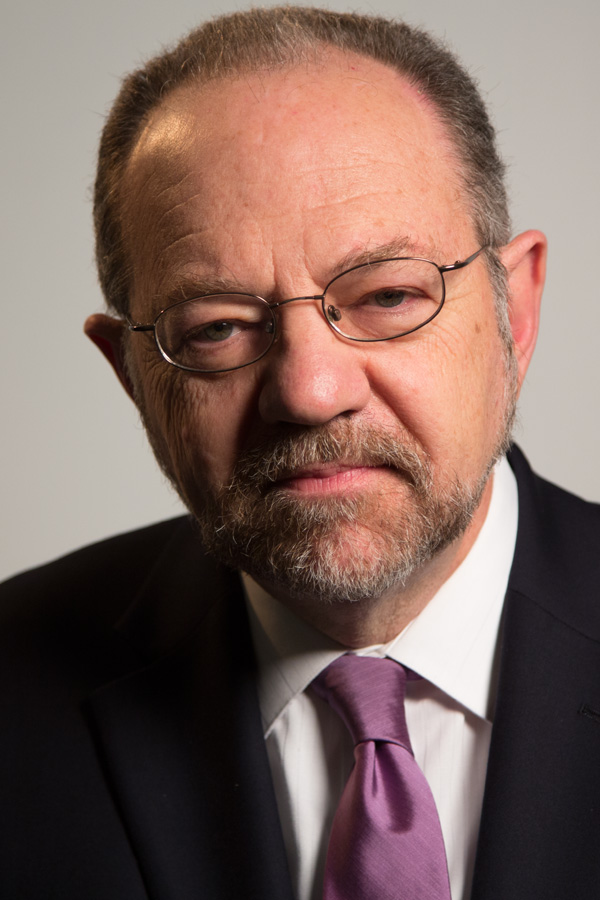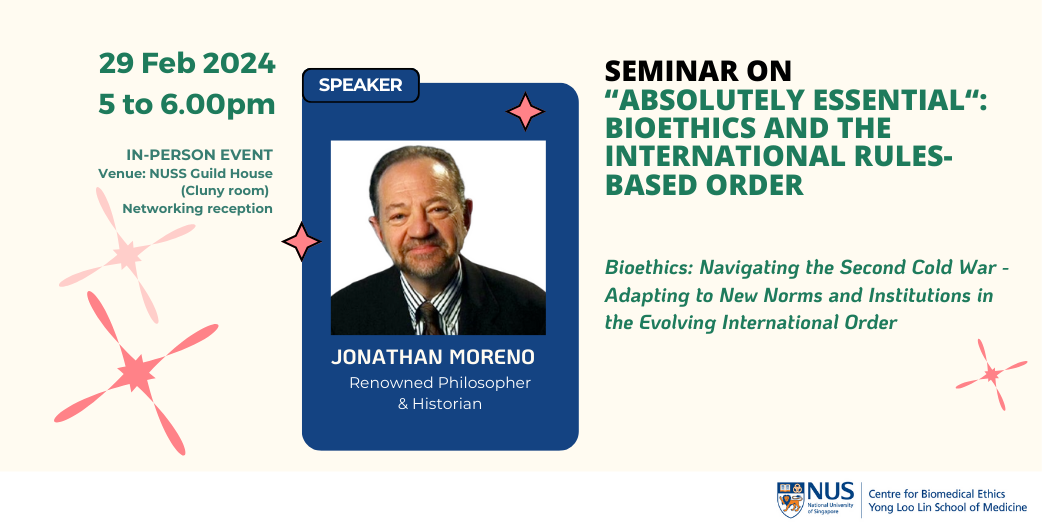“Absolutely Essential”: Bioethics and the International Rules-Based Order
Synopsis
The field that came to be known as bioethics in the late 1960’s is an integral part of the liberal international order intentionally developed in the aftermath of the catastrophe of World War II. Following the Russian war in Ukraine there is every reason to believe that the set of norms and institutions that preserved peace in Europe through the first Cold War will be revised according to new assumptions that will structure international relations in a second Cold War. Bioethics will need to adapt to the conditions of the new Cold War, as it was shaped by the conditions of the last.
Speaker's Biography

Professor Jonathan Moreno
David and Lyn Silfen University Professor of Ethics
Penn Integrates Knowledge (PIK) professor
Professor of Medical Ethics and Health Policy, History and Sociology of Science, and Philosophy
University of Pennsylvania.
Biography
Jonathan D. Moreno is the David and Lyn Silfen University Professor of Ethics at the University of Pennsylvania where he is a Penn Integrates Knowledge (PIK) professor. At Penn he is also Professor of Medical Ethics and Health Policy, of History and Sociology of Science, and of Philosophy. Moreno is a fellow of The Hastings Center, a member of the National Academy of Medicine and of the Committee on Human Rights of the National Academies of Science, Engineering and Medicine.
Moreno has served as a staff member or adviser to many governmental and non-governmental organizations, including three U.S. presidential commissions, the Howard Hughes Medical Institute, the Bill and Melinda Gates Foundation, and the UNESCO International Bioethics Committee. In 2008-09 he served as a member of President Barack Obama’s transition team. Moreno is currently a member of the Bayer Bioethics Council. He was named an official “Mad Scientist” by the U.S. Army’s Training and Doctrine Command. He is an investigator on a $1.1 million Department of Defense Minerva Research Initiative project on artificial intelligence-enabled neurotechnologies and warfighters. He is also senior consultant to a six-year, 10 million-euro European Research Council project on cold war health care systems on both sides of the iron curtain.
Moreno received his Ph.D. in philosophy from Washington University in St. Louis, was an Andrew W. Mellon post-doctoral fellow, holds an honorary doctorate from Hofstra University, and is a recipient of the College of William and Mary Law School Benjamin Rush Medal, the Dr. Jean Mayer Award for Global Citizenship from Tufts University, and the Penn Alumni Faculty Award of Merit. He has held the honorary Visiting Professorship in History at the University of Kent in Canterbury, England. In 2018 the American Society for Bioethics and Humanities presented him with its Lifetime Achievement Award.
His most recent books are Everybody Wants to Go to Heaven but Nobody Wants to Die, co-authored with former Penn president Amy Gutmann, now U.S. Ambassador to Germany; and The Brain in Context. Among his previous books are Impromptu Man: J.L. Moreno and the Origins of Psychodrama, Encounter Culture, and the Social Network; The Body Politic, which was named a Best Book of 2011 by Kirkus Reviews; Undue Risk, nominated for the Virginia Literary Award; and Mind Wars. He is currently writing a book about the place of bioethics in the rules-based international order. Moreno has published more than a thousand papers, articles, reviews and op-eds and has been translated into several languages.
Moreno has published in venues including The New York Times, The Wall Street Journal, Science, Nature, Slate, Politico, The Hill and Foreign Affairs. He is often interviewed on broadcast and online media. He was co-host of Making the Call, an Endeavor Content podcast, and was a columnist for ABCNews.com. As a senior fellow at the Center for American Progress in Washington, DC. he edited the online magazine Science Progress. The American Journal of Bioethics has called him “the quietly most interesting bioethicist of our time.”
Videos from the seminar
For enquiries, contact cet_cbme@nus.edu.sg

